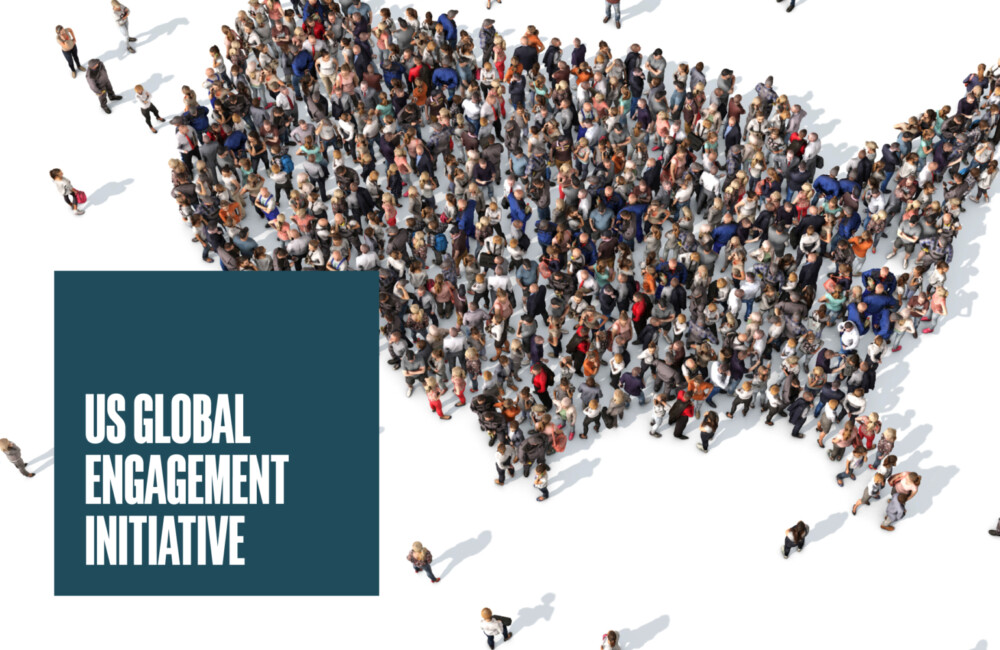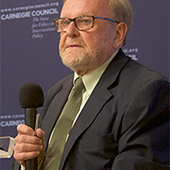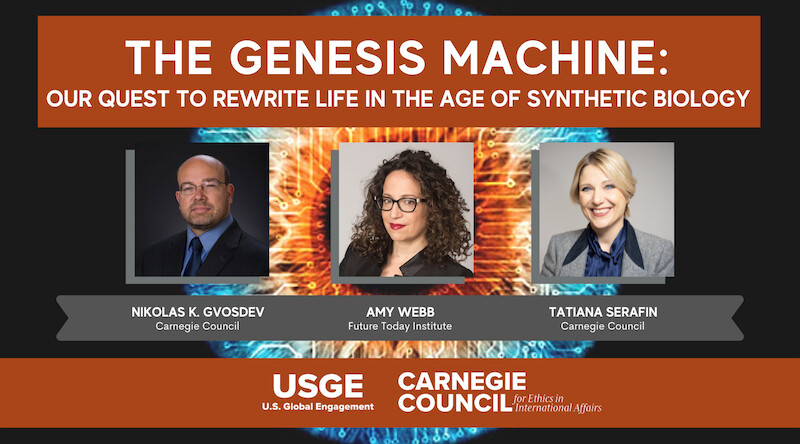Sebastian Junger recounts some of his experiences while embedded with U.S. troops in Afghanistan. Referring to a recent Carnegie Council panel, David Speedie discusses the ethics of withdrawal, given that the U.S. has set a timetable for leaving and is in negotiations with the Taliban.
This interview is posted with kind permission from NEWSWEEK On Air.
The Carnegie Council's U.S. Global Engagement program gratefully acknowledges the support for its work from the following: Alfred and Jane Ross Foundation, Rockefeller Brothers Fund, U.S. Army War College, Rockefeller Family & Associates, and Donald M. Kendall.
MELISSA EXELBERTH: The war in Afghanistan is not going as well as was hoped. A month after Admiral Mike Mullen, the Joint Chiefs of Staff Chairman, proclaimed Kandahar a cornerstone, AP national security correspondent Sagar Meghani last week reported growing doubts about the strategy, based on an earlier "clear and hold" operation. Yet for allied soldiers in the country's combat zones, the overall direction is rarely as distinct as the daily demands to kill bad guys, protect good guys, and survive yourself.
DAVID ALPERN: We continue our consideration of war now with veteran journalist and author Sebastian Junger, who embedded with American forces in Afghanistan for his new book War, from Twelve Publishers.
Also with us is David Speedie, Director of the U.S. Global Engagement Program at the Carnegie Council for Ethics in International Affairs.
First, to Sebastian. Welcome to NEWSWEEK On Air.
SEBASTIAN JUNGER: Thank you very much.
DAVID ALPERN: The war most of us see on screen these days, fact or fiction, seems pretty grim. But you paint one scene of surprising levity, as the troops you were with devastate enemy forces in a valley below—flip-flops, shorts, jokes, laughter. Give us a brief account.
SEBASTIAN JUNGER: Combat really contains everything. There were a lot of firefights where guys were getting killed, and the men I was with were very, very scared, as was I. The firefight you're describing—the men had very good cover. They were attacked unexpectedly at their outpost, and they were in shorts and flip-flops, because that's what they were wearing when they got hit. Because they really weren't in danger at that moment—there's a lot of adrenaline in combat, and it often comes out in this very intense form of humor.
MELISSA EXELBERTH: Later you found yourself unable to forget the way the Americans reacted to the death of a single enemy fighter, whose leg had been blown away. Talk about that and why it troubled you.
SEBASTIAN JUNGER: The Americans, of course, had very complicated relations with the Afghans. There was an elderly Afghan and his 15-year-old grandson who were kidnapped by the Taliban and had their throats cut. The soldiers were almost in tears about it, because they were very, very fond of those two particular people.
On the other hand, the Taliban fighters were shooting at them almost every day. The casualties were very, very high. As one guy explained after that firefight where everyone was sort of whooping it up because they saw this guy that they'd killed, he said, "You know, we almost never get to see the enemy. That's one guy who is not going to kill my friend tomorrow or kill me tomorrow."
I think the joy—it's not quite joy, but the celebration, I think, is basically a recognition of the fact that the stakes are very, very high. And all those guys—ultimately, what they really want to do is get home alive.
DAVID ALPERN: How aware are they of the larger course of war—defeats, suicide bombings, withdrawals from other valleys?
SEBASTIAN JUNGER: I could say that they're probably as aware of events in other valleys as we back home might be aware of events in another town. They're of a kind of abstract interest, but that's about it. I was with one platoon, 30 men, in a very small outpost, with a lot of combat off and on for a year. The men I was with, their concern was the fight that was right in front of them, the fighters who were shooting at them and killing them. And it really was not broader than that.
MELISSA EXELBERTH: Do you sense that the nature of war today, with modern weapons, from longer distances—maybe even remotely, with robot drones—has desensitized soldiers to the killing they must do, maybe to the inevitable civilian casualties, more than in earlier wars? Or is desensitizing always essential to getting the job done?
SEBASTIAN JUNGER: Compared to pushing a knife into someone's stomach, yes, absolutely, modern weapons are desensitizing. I was in a Humvee that was blown up by a roadside bomb. The guy who blew us up—he almost killed us; he came very, very close to killing us—I don't think he was seeing us in a particularly human way. The men I was with who shot back at him, likewise. I don't think they were thinking of him in human terms.
But, unfortunately, that's what war is. That's how it works. I think that's a reality that goes back, probably, to the Stone Age.
DAVID ALPERN: Sebastian Junger's new book is War, from Twelve Publishers.
Next to David Speedie, of the Carnegie Council on Ethics and International Affairs, where he recently ran a panel on the Afghan challenge.
Welcome to NEWSWEEK On Air.
DAVID SPEEDIE: Thank you for having me.
DAVID ALPERN: From an ethical perspective, how do you judge the current strategy of massive military operations against the Taliban, on one hand, while also trying to engage many of them in negotiations for a return to normalized roles in society and government?
DAVID SPEEDIE: That was the focus of our panel, the ethics of withdrawal from Afghanistan. Part of the endgame for withdrawal, of course, is the proposed negotiation for the Taliban to have some role in a future Afghan government.
One panelist mentioned an ABC poll where 58 percent of Afghans see the Taliban as the threat, the problem, and only about 8 percent see the U.S. as a threat or problem. In other words, we still have the hearts of the Afghan people to a remarkable degree. But it is fragile.
In this context, there are the ongoing negotiations with the Taliban, some elements of whom may come back into a future government. The position of the U.S. administration is that, for that to happen, the Taliban must accept the Afghan constitution, which, as it stands, is one of the most progressive in the Muslim world. Part of this is that 25 percent of the seats in the Parliament are allocated to women. This is a recognition of the need to greatly enhance and improve the role of women in Afghan society generally.
But this, of course, is just the merest start, and it's very fragile. One of our panelists, in particular, had intense and prolonged conversations with Afghan women about their role in society, and they are, of course, concerned, quite justifiably, that one element that will be negotiable if we get into this dialogue with the Taliban for a future role in government is women's rights, along with the restoration of Taliban policies such as very harsh marriage laws, women involved in the workforce, and so on and so forth. This is particularly true given attacks on girls' schools in remote parts of Afghanistan and so on and so forth.
MELISSA EXELBERTH: And what did your panelists conclude about the ethics, even the security rationale, of withdrawing at all or in significant numbers on President Obama's 18-month timetable, with Afghanistan still in such fragile and chaotic shape?
DAVID SPEEDIE: Absolutely. A few facts came up. Twenty-five percent of the people of Afghanistan at this point do not have adequate food supplies. Only 12 percent of Afghans have access to sanitized drinking water. The life expectancy of Afghans is 43. It is by all measurable standards one of the five least developed countries in the world.
So that's the context in which the ethics of withdrawal were discussed. Of course, to the policy of clear, hold, and build, we now add the term "transfer." So the policy of the administration is, clear, hold, build, and transfer. But the whole notion of transfer seems to be an empty prospect without the security that's required for transfer to Afghan hands—in other words, for this withdrawal period that the President is contemplating.
DAVID ALPERN: David Speedie is U.S. Global Engagement Program Director at the Carnegie Council on Ethics and International Affairs. We also heard from Sebastian Junger. His new book is War.




